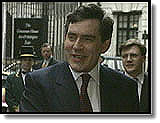
|
Brown and Blair Rule Out Scottish Tax RisesThe Prime Minister, Tony Blair, and the Chancellor Gordon Brown have underlined their pledge that Scottish taxpayers will face no rise in basic or top rate income tax over the next five years - even if Scots back a devolved Parliament with tax-varying powers.And Mr Brown insisted that business was demonstrating its confidence in the future of Scotland with a devolved Parliament by continuing to make major investments, although new poll results would seem to contradict the Chancellor. But the Conservative constitutional affairs spokesman, Michael Ancram, warned that the Labour Government would have to ask "serious questions" if turn-out was low in Thursday's referendum north of the border. The comments came as devolution campaigns resumed in earnest in Scotland and Wales after the enforced break in the debate due to the death of Diana, Princess of Wales.
Blair Pushing for a Double PositiveHe will be pushing for a `yes, yes' vote in Thursday's referendum: yes to a Scottish parliament and yes to that parliament being handed tax-varying powers of up to 3p up or down. But Mr Blair stressed that, though he hoped the Scottish Parliament would be able to vary tax, under this Labour Government, it would not exercise those powers. "What is being proposed here is a power to vary revenue of the nature of less than 5% of the overall budget - and the smallest local authority has a revenue-varying power.
No New Taxes for Five Years"That's a commitment that we've made that holds in Scotland as well as elsewhere. But, for the Parliament to have this flexibility and have this power, seems to me entirely sensible," the Prime Minister said.
Mr Brown, speaking on GMTV's Sunday programme, said the new Parliament would not need to raise taxes for the first five years: "Because the first job of this Scottish Parliament is to look at whether the money, existing money - £14 billion of money - is well spent. And they will be wanting to save money, cut waste, cut bureaucracy and red tape." Later the Chancellor, along with pro-Scottish National Party actor Sean Connery, announced new jobs at the Rosyth shipyard. He said he was highlighting the 18th new inward investment in Scotland since the election. "International investors are expressing confidence in Scotland in the full knowledge that our institutions are being modernised, that change is taking place, that these proposals are on the table, and I think that is a vote of confidence in the Scottish economy."
|

